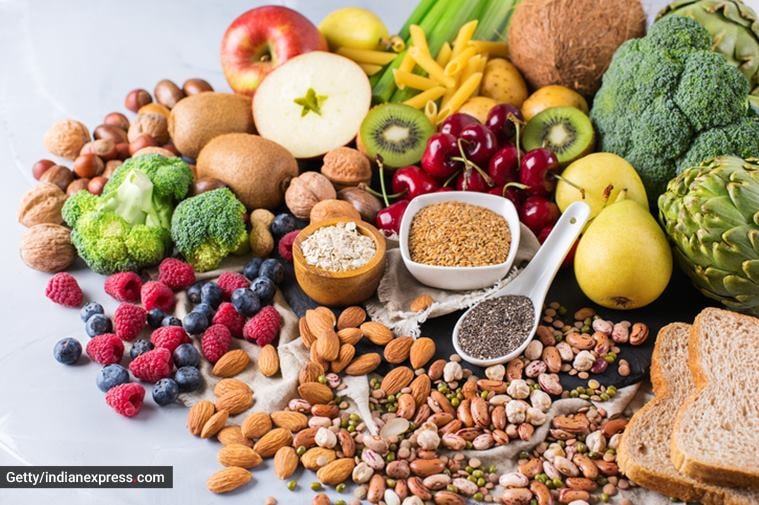From indianexpress.com
FOR STRONG BONES, IT IS IMPORTANT TO ENSURE THAT THE VEGAN DIET CONTAINS APPROPRIATE AMOUNTS OF CALCIUM
“A survey conducted in 2019 found out that around 69 per cent of Indians are ready to give up meat for plant-based options. For those with type 1 or type 2 diabetes, a plant-based (vegan) diet, or a vegetarian diet is preferred as it helps manage and prevent or even reverse type 2 diabetes, as per studies. A vegan diet is a part of vegetarianism that excludes meat, fish, eggs, poultry, dairy products and honey. A healthy vegan diet also avoids processed and refined foods like artificial foods with additives and olive oil,” said G Prakash, Deputy Chief Medical Officer, Jindal Naturecure Institute.
Veganism can help diabetes in different ways
The expert said that plant-based foods like vegetables, fruits, seeds, nuts, and pulses can help in the treatment of various chronic diseases, including type 2 diabetes. Since foods like non-starchy vegetables, several types of fruits, seeds, nuts, and beans tend to have a low glycaemic index, there are fewer chances of a spike in blood sugar levels when consumed.
“The other positive aspect of a vegan diet is that the low glycaemic load also enhances healthy gut biofilms. The gut biofilms are thin protective barriers that build up around bacteria in the gut and make it difficult for glucose to penetrate. This, in turn, slows down the glycaemic effect in the diet,” he shared.
He added that most people with type 2 diabetes are “either obese or overweight, consuming foods with a low glycaemic index also helps combat fat storage and prevent insulin resistance“.
The other plus of a vegan diet is that it helps lower cholesterol, reduces saturated fat and lowers chances of heart disease; all these can benefit a person with diabetes mellitus.
Studies have also shown that a vegan diet may
*Lower blood pressure
*Improve nerve damage
*Ease metabolic syndrome
*Help keep A1c level under check
Maintaining key nutrients in a vegan diet
“While it is true that a vegan diet is beneficial for diabetic people, certain plant-based foods have lower nutrient content than non-vegetarian foods. However, with proper planning and eating various foods, it is possible to provide the body with everything it requires,” he said.
Here are some specific considerations to be made while planning a healthy, nutritious vegan diet:
Protein
Many vegans in the beginning may panic as to whether they are consuming the right amount of protein This isn’t just a big issue as the majority of us consume enough protein throughout the day. There are plenty of vegan foods as well that are recognised to be as rich sources of protein like
Pulses and beans
Seeds and nuts such as tahini, cashew, peanut, etc.
Soya products
Quinoa
Vegetable milk
Calcium
For strong bones, it is important to ensure that the vegan diet contains appropriate amounts of calcium. Calcium is essential throughout life, but it’s especially important when children are growing up. Vegan foods that have adequate amounts of calcium include:
Oranges
Almonds
Chickpeas
Red kidney beans
Tahini
Vitamin B12
Vitamin B12 is crucial for the nervous system’s proper working and keeping the blood cells healthy. In animal products, this vitamin is found naturally, but vegans need to compensate for the same by adding foods in their diet like
Nutritional yeast
Seaweed/algae
Fortified plant milk
Mushrooms
“There are plenty of other nutrients such as omega-3 fatty acids, iron, iodine, zinc, and selenium, which can be supplemented by consuming lots of vegetables, nuts, seeds, pulses, walnuts, dried fruits, and breakfast cereals,” he shared.
The above article is for information purposes only and is not intended to be a substitute for professional medical advice. Always seek the guidance of your doctor or other qualified health professional for any questions you may have regarding your health or a medical condition.
https://indianexpress.com/article/lifestyle/health/vegan-diet-diabetes-fitness-7662879/

No comments:
Post a Comment